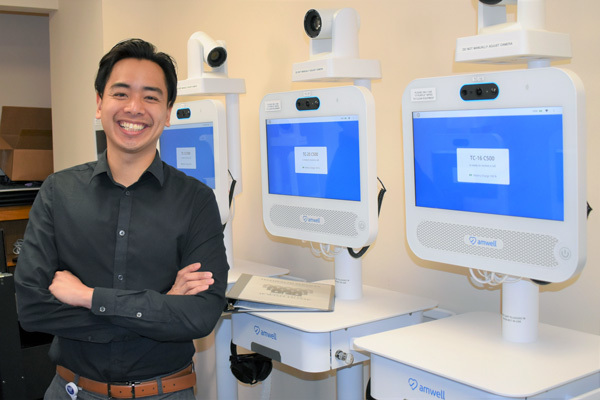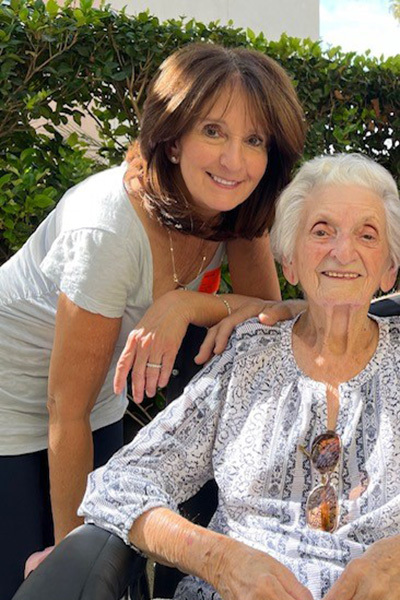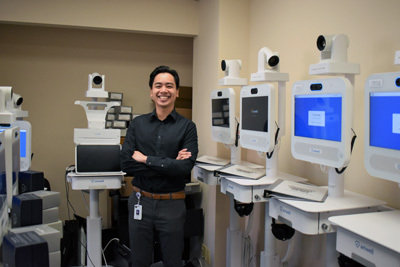Los Angeles Jewish Health A Leader in Telehealth for Seniors


Los Angeles Jewish Health A Leader in Telehealth for Seniors

Identifying impactful ways to optimize the well-being of older adults is a central focus of our work at Los Angeles Jewish Health (LAJHealth). We are constantly seeking innovative approaches to raising the bar on clinical care, and our telehealth program is a case in point, leveraging leading-edge technology to ensure our seniors can thrive.
Launched with funding from the Federal Communications Commission (FCC), which selected LAJHealth as the lead grantee in California to pilot a telehealth program, our organization's initiative deploys state-of-the-art mobile carts—each equipped with a tablet computer, digital stethoscope and otoscope, a camera, speaker/microphone system and WIFI— throughout Los Angeles Jewish Health campuses, enabling physicians to care for patients, from a distance, in an individualized and caring way. Whether for routine visits or to assess changes in medical condition, telehealth appointments offer patients, families and physicians a wide range of critical advantages.
"In any discussion of the telehealth program, it's first important to stress that this is not just doctors seeing residents over Zoom or FaceTime," notes Noah Marco, MD, chief medical officer with Los Angeles Jewish Health. "These are highly sophisticated, patient-centered encounters through which we are actually able to hear and evaluate heart and lung sounds, look inside patients' ears and mouths, and see their tiniest skin lesions."
"Our experience has been that, once patients and their loved ones become comfortable with the technology involved, the benefits of telehealth are immediately apparent to them," he says.
Patient convenience is one of the major benefits. "For many of our residents, travel to and from physicians' offices can be challenging at best, causing them to disrupt their routines to do what's convenient for their doctor," Dr. Marco says. "Telehealth alleviates this burden, allowing them to check in with their doctors and share any concerns from the comfort of their own rooms."
Anton Domingo, a registered nurse and LAJ Health's telehealth program manager and quality analyst, says the telehealth consults are particularly helpful when a resident is experiencing a change in condition.
"In more urgent situations, when we need to determine whether a resident may need to be transferred to the hospital, a telehealth appointment gets the doctors' eyes on the patient almost immediately, allowing the provider to see the patient and correlate the data provided with the patient's status in real time," Anton says. "This translates to better, more informed decision-making about the necessity of hospital transfers, which ultimately means less strain on—and less cost for—our residents."
In fact, according to data gathered by LAJHealth as part of this pilot program, telehealth visits lessened the need for nearly 20 percent of transfers to acute care facilities.
The pandemic has further highlighted the wisdom of including telehealth options in patient care. "For instance, say a patient needs to be in isolated care due to a transmittable disease, we can dedicate a telehealth cart to that area, making sure the resident has easy and timely access to the provider he or she needs for their care," Anton says.
The telehealth program also lets residents' families play a more active role as a member of their comprehensive care team. "When the patient, the provider and a family member come together, we get more and better information, and the quality of the care inevitably improves," Dr. Marco says. "Family members really benefit from hearing from their loved ones' physicians directly because it puts everyone on the same page and ensures we answer everybody's questions in a comprehensive way."

That was the case for Erit Siegal, whose mother, 97-year-old Los Angeles Jewish Health resident Katherina Schaffer, signed up to participate in the telehealth program. "My mom, who is originally from Czechoslovakia and survived three different concentration camps, is miraculously healthy and 100 percent cognitively fine. She's one tough cookie," Erit says. "She moved to LAJHealth about a year ago. When she needed some routine care, she saw Dr. Marco via telehealth, and I was on the call, as well."
"It was a good experience," she continues. "Dr. Marco asked questions, my mom answered, and I was there, watching and listening the whole time. It was super convenient, especially during COVID, because we got the attention we needed while minimizing interruption to my mom's day and limiting the exposure she (and other residents) would have had if I had needed to come to campus for the appointment."

LAJHealth currently has 25 telehealth carts; 12 of them are deployed across four different facilities, resulting in more than 40 virtual visits so far this year. It's a promising start, and plans are for the program to expand. That expansion – and the program itself—are the result of generous support not just from the FCC, but also from numerous individuals and foundations.
"We've seen telehealth add real value for so many of our residents, and we look forward to making the program even more accessible going forward," Dr. Marco says. "At Los Angeles Jewish Health, we work to give each of our seniors every health advantage possible."